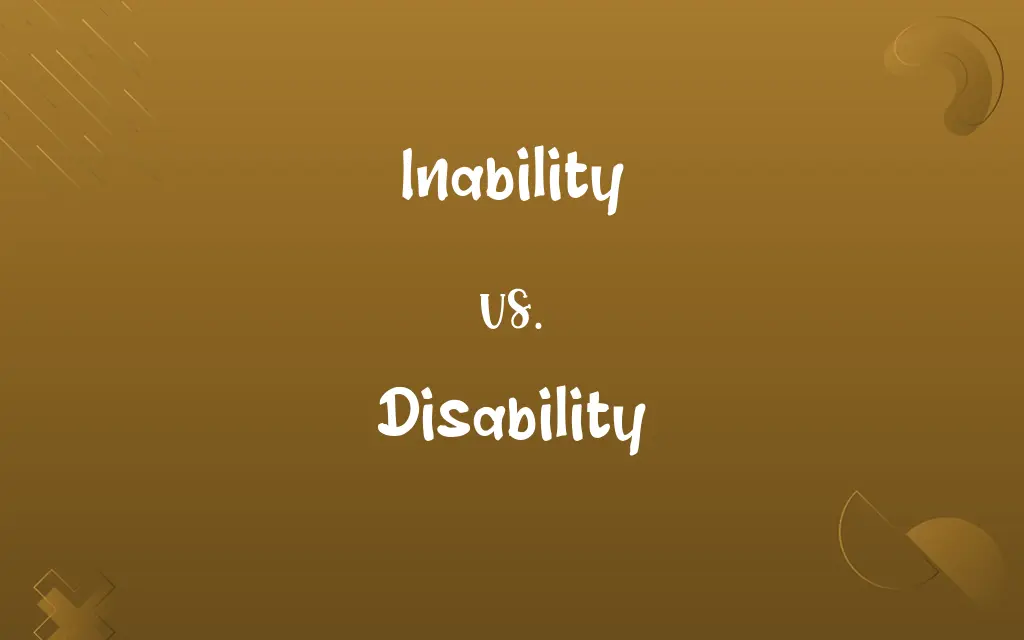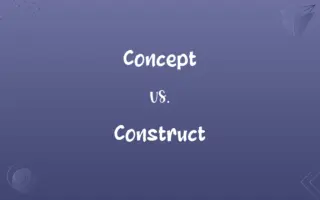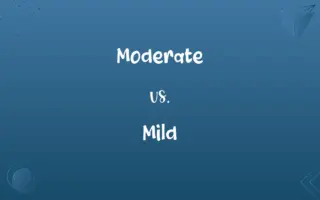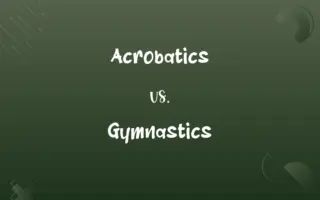Inability vs. Disability: Know the Difference

By Dua Fatima & Hifza Nasir || Published on August 9, 2024
Inability refers to a lack of skill, strength, or capability to do something, often temporary or situable, while disability is a long-term condition that limits a person's movements, senses, or activities, recognized legally and socially.

Key Differences
Inability is a general term that signifies the absence of capability to perform a particular task or action due to various reasons such as lack of skill, knowledge, or resource. For example, someone may have the inability to swim if they've never learned how. Disability, on the other hand, specifically refers to a physical or mental impairment that substantially limits one or more major life activities, such as walking or speaking.
Hifza Nasir
Aug 09, 2024
Inability can often be overcome with training, education, or access to resources, disabilities may require accommodations, support, or interventions to enable individuals to participate fully in activities. For instance, inability to swim can be addressed with lessons, but a disability affecting mobility might require physical therapy or assistive devices.
Hifza Nasir
Aug 09, 2024
Inability and disability intersect in the context of accessibility and inclusion. An inability to access a building due to stairs speaks to a structural disability for those who use wheelchairs, indicating that the environment can disable individuals based on their physical conditions.
Dua Fatima
Aug 09, 2024
Societally, the perception of inability and disability varies. Inability is often viewed as a temporary or fixable condition, while disabilities are recognized through legal and medical frameworks, granting rights and protections to those who have them. This recognition impacts how individuals receive accommodations in public spaces, education, and employment.
Hifza Nasir
Aug 09, 2024
The terms also differ in their legal and social implications. Disabilities are covered under laws like the Americans with Disabilities Act (ADA) in the U.S., ensuring rights and accommodations. In contrast, general inabilities do not typically fall under specific legal protections, highlighting the importance of distinguishing between the two in policy and practice.
Dua Fatima
Aug 09, 2024
ADVERTISEMENT
Comparison Chart
Definition
Lack of skill, knowledge, or capability
Physical or mental impairment limiting activities
Hifza Nasir
Aug 09, 2024
Overcoming
Often possible through training or resources
May require accommodations, support
Dua Fatima
Aug 09, 2024
Legal Protections
Generally none specific
Often covered by laws (e.g., ADA in the U.S.)
Hifza Nasir
Aug 09, 2024
Impact on Activities
Specific tasks or actions
One or more major life activities
Dua Fatima
Aug 09, 2024
ADVERTISEMENT
Societal Perception
Temporary, fixable condition
Recognized condition requiring rights, supports
Dua Fatima
Aug 09, 2024
Examples
Inability to swim, solve complex math problems
Mobility impairments, visual impairments
Shumaila Saeed
Aug 09, 2024
Inability and Disability Definitions
Inability
Lack of legal qualification.
His inability to vote was due to not being a citizen.
Shumaila Saeed
Feb 29, 2024
Disability
Mental impairment.
His learning disability affects his reading and writing speed.
Dua Fatima
Feb 29, 2024
ADVERTISEMENT
Disability
Chronic condition.
Her diabetes is considered a disability under law.
Dua Fatima
Feb 29, 2024
Inability
Lack of physical capability.
His inability to reach the top shelf called for a step stool.
Dua Fatima
Feb 29, 2024
Disability
Physical impairment.
Her disability requires the use of a wheelchair for mobility.
Shumaila Saeed
Feb 29, 2024
Inability
Absence of knowledge.
Her inability to speak Spanish made communication difficult in Spain.
Shumaila Saeed
Feb 29, 2024
Disability
Psychological condition.
Her anxiety disorder is recognized as a disability.
Hifza Nasir
Feb 29, 2024
Inability
Insufficient resources.
Their inability to afford a new computer delayed the project.
Dua Fatima
Feb 29, 2024
Disability
Sensory impairment.
His visual disability necessitates the use of screen-reading software.
Shumaila Saeed
Feb 29, 2024
Disability
A physical or mental condition that significantly limits a person's motor, sensory, or cognitive abilities.
Dua Fatima
Feb 28, 2024
Inability
The quality or state of being unable; lack of ability; lack of sufficient power, strength, resources, or capacity.
It is not from an inability to discover what they ought to do, that men err in practice.
Dua Fatima
Feb 28, 2024
Disability
A mental condition causing a difficulty with an intellectual task.
Dyscalculia is math disability.
Dua Fatima
Feb 28, 2024
Disability
The condition of being unable to perform as a consequence of physical or mental unfitness;
Reading disability
Hearing impairment
Dua Fatima
Feb 28, 2024
Disability
The state of having such a condition
Discrimination based on disability.
Dua Fatima
Feb 28, 2024
Disability
(disability theory) An inability imposed on a person by society's failure to accommodate their physical or mental differences from others, as opposed to impairment.
Shumaila Saeed
Feb 28, 2024
Repeatedly Asked Queries
Can an inability turn into a disability?
Generally, inability and disability are distinct; however, an untreated condition causing inability could lead to or be recognized as a disability.
Hifza Nasir
Aug 09, 2024
Is inability always negative?
Not necessarily; it can be a temporary state that motivates learning and growth.
Dua Fatima
Aug 09, 2024
What is the main difference between inability and disability?
Inability refers to a lack of skill or capacity in a specific area, while disability denotes a medical or physical condition limiting major life activities.
Hifza Nasir
Aug 09, 2024
Can someone with a disability overcome their limitations?
Yes, many individuals with disabilities use accommodations, therapies, and technologies to participate fully in activities.
Dua Fatima
Aug 09, 2024
How are disabilities recognized legally?
Disabilities are recognized through legislation that provides for accommodations and protections, such as the ADA in the U.S.
Dua Fatima
Aug 09, 2024
Are all inabilities due to lack of effort?
No, inabilities can stem from various factors, including lack of access to resources or education.
Dua Fatima
Aug 09, 2024
Do disabilities always require medical intervention?
Not always, some disabilities may require accommodations or adjustments rather than medical treatment.
Shumaila Saeed
Aug 09, 2024
Are all disabilities permanent?
No, disabilities can be temporary, permanent, or fluctuate over time.
Dua Fatima
Aug 09, 2024
Can an inability be a result of a disability?
Yes, a disability can result in the inability to perform certain tasks without accommodations.
Shumaila Saeed
Aug 09, 2024
How does society's perception of inability and disability differ?
Society may view inabilities as temporary and fixable, whereas disabilities are seen as conditions requiring accommodations and support.
Dua Fatima
Aug 09, 2024
Is learning difficulty considered a disability?
Yes, learning difficulties are often recognized as disabilities that can impact educational activities.
Dua Fatima
Aug 09, 2024
Can technology reduce the impact of disabilities?
Absolutely, technology plays a crucial role in enhancing accessibility and independence for individuals with disabilities.
Dua Fatima
Aug 09, 2024
Do environmental factors influence disability?
Yes, environmental factors can exacerbate disabilities or create barriers to accessibility.
Dua Fatima
Aug 09, 2024
Is emotional distress considered a disability?
Emotional or psychological conditions can be recognized as disabilities if they significantly limit one's daily activities.
Shumaila Saeed
Aug 09, 2024
What role does education play in overcoming inabilities?
Education is key to overcoming inabilities by providing the necessary skills, knowledge, and resources.
Dua Fatima
Aug 09, 2024
Share this page
Link for your blog / website
HTML
Link to share via messenger
About Author
Written by
Dua FatimaCo-written by
Hifza Nasir






























































